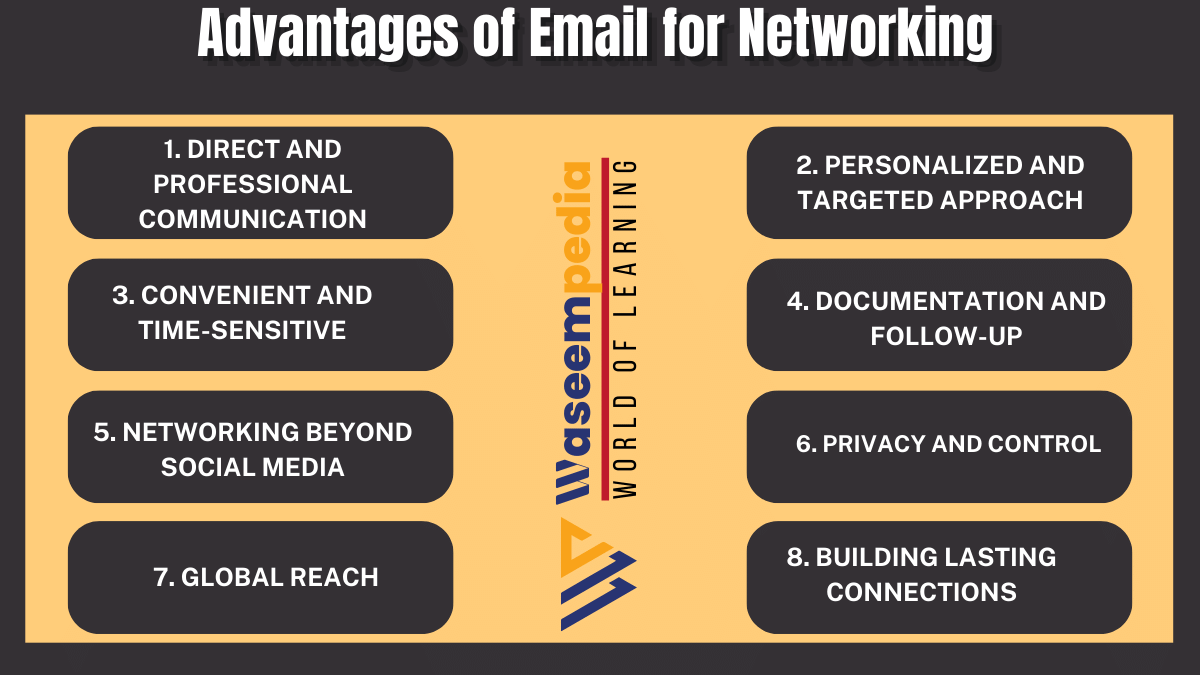While social media platforms have their place in networking, email offers distinct advantages for building professional relationships.
With direct and professional communication, personalized approaches, convenience, documentation capabilities, privacy, global reach, and the potential to build lasting connections, email remains a powerful tool for networking success.

In this article, we will read the advantages of using email for networking and how it is important for business.
Importance of Networking
Networking is essential for professional growth and success. It involves establishing and nurturing relationships with individuals who can offer guidance, support, collaboration, or new opportunities. While networking can take place through various channels, email provides unique advantages for fostering meaningful connections.
Email plays a vital role in businesses with lead generation, automation, and appointment scheduling, Email communication.
8 Advantages of Email for Networking
8 Advantages of Email for Networking are as following
1. Direct and Professional Communication
Email allows for direct and professional communication between individuals. It provides a formal platform to initiate conversations, introduce oneself, and exchange information. With email, you can craft well-thought-out messages, showcase professionalism, and make a positive impression on potential contacts.
2. Personalized and Targeted Approach
One of the significant advantages of email for networking is the ability to personalize your messages. You can tailor each email to the specific recipient, highlighting their achievements or common interests. Personalization shows your genuine interest in connecting and increases the chances of receiving a response.
3. Convenient and Time-Sensitive
Email offers convenience and time-sensitivity in networking. It allows individuals to send messages at their convenience, ensuring they have time to carefully craft their communication. Furthermore, recipients can respond when it’s most convenient for them, providing flexibility and accommodating busy schedules.
4. Documentation and Follow-Up
Email serves as a reliable documentation tool for networking. It allows you to keep a record of your conversations, contacts, and important details. This documentation proves helpful for follow-up actions, such as sending additional information, scheduling meetings, or recalling previous discussions, fostering continued engagement.
5. Networking beyond Social Media
While social media platforms are popular for networking, email offers a more personal and focused approach. It allows you to engage in one-on-one conversations and develop deeper connections with individuals. Email enables you to showcase your professionalism and unique value proposition beyond the limitations of social media interactions.
6. Privacy and Control
Email provides a higher level of privacy and control compared to public networking platforms. You can choose whom to connect with and have control over the information you share. This sense of privacy fosters a secure environment for networking, encouraging individuals to communicate more openly and establish trust.
7. Global Reach
Email enables networking on a global scale. Regardless of geographical boundaries, you can connect with professionals from different countries and cultures. This global reach expands your network, exposes you to diverse perspectives, and creates opportunities for international collaborations or business ventures.

8. Building Lasting Connections
Email facilitates the building of lasting connections in networking. It allows for ongoing communication beyond the initial introduction or networking event.
By maintaining regular contact through email, you can nurture relationships, provide support, exchange knowledge, and explore collaborative opportunities in the long run.
Related FAQ’s
What is the importance of email in networking?
Email is crucial in networking as it allows people to communicate quickly and efficiently over the internet, helping them stay connected and exchange information in a professional manner.
What are 5 advantages of emails?
Speed and Efficiency: Emails are sent and received instantly, allowing fast communication.
Global Reach: They can be sent to anyone with an internet connection, making communication worldwide.
Documentation: Emails provide a written record of conversations and important information.
Cost-effective: Sending emails is usually free, reducing communication expenses.
Attachments: Files and documents can be easily shared as attachments, making it convenient for sharing information.
What is email in networking?
Email in networking is a method of sending and receiving electronic messages over the internet, enabling people to communicate quickly and efficiently. It allows users to exchange written messages and share files with others worldwide.
Why email is the best form of communication?
Email is often considered the best form of communication because it is fast, convenient, and allows for documentation. It enables people to send messages and share information quickly, making it easy to stay in touch with others around the world. Additionally, email provides a written record of conversations, making it useful for reference and record-keeping.
Why email is so powerful?
Email is powerful because it enables quick and efficient communication, connects people globally, and provides a permanent record of conversations and information. It allows individuals and businesses to stay connected, share ideas, and exchange important documents, making it an indispensable tool in today’s digital world.

